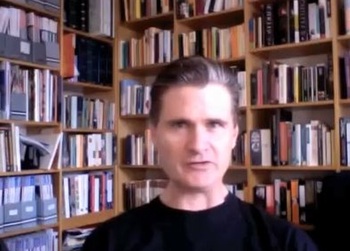[Update 1.30pm: Prime Minister Gillard has just announced her cabinet changes and Senator Conroy remains where he is. If you listen to the interview you’ll realise why.]

Now that Julia Gillard is Prime Minister, could or should Senator Kate Lundy replace Senator Stephen Conroy as Minister for Broadband, Communication and the Digital Economy?
Delimiter‘s Renai LeMai has previously suggested that Lundy would make a better communications minister, and last Thursday he asked the question again. Gizmodo Australia is even actively campaigning for the change.
ZDnet.com.au‘s David Braue also reckons Gillard can save the comms ministry by involving Lundy — although he doesn’t go as far as calling for Conroy to be sacked, instead suggesting he become the Minister for the National Broadband Network.
In this week’s Patch Monday podcast, to be posted this morning, I chat with Crikey‘s Canberra correspondent Bernard Keane (pictured) about the possibility.
The #nocleanfeed anti-censorship campaigners might think a change in PM is reason enough to lobby for a change in communications minister, but Keane is not so sure. We cover that in the Patch Monday conversation.
Once we got talking, we also chatted about the historical context. A previous communications minister, Senator Richard Alston, was twice voted “global village idiot”, for instance. And we went into the political issues in more depth than appropriate for Patch Monday‘s technology industry focus. So, here’s the full conversation.
Podcast: Play in new window | Download (Duration: 21:00 — 10.1MB)
I always record much more material than ends up in articles or podcasts, so I’m toying with the idea of posting all of my raw interviews here. Whaddyareckon?
Just in case I take that path, I’m creating a category of posts called Conversations, and you can subscribe to the RSS feed.



